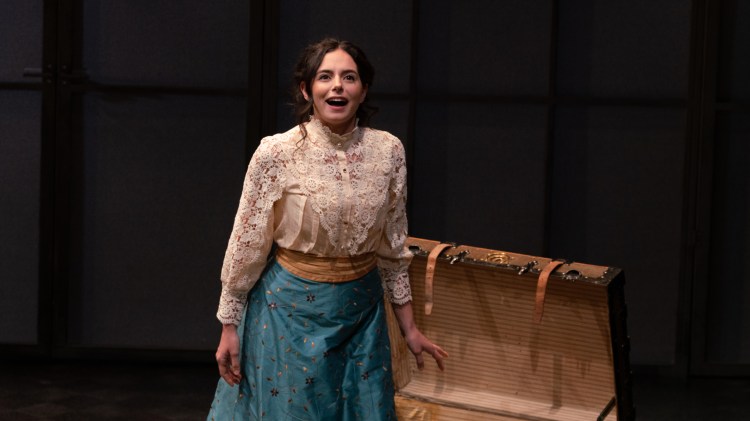Sigmund Freud and Carl Jung are considered the founders of psychoanalysis, but the contributions and collaboration of their pioneering colleague, Sabina Spielrein—who was also Jung’s patient as a teenager—is often forgotten to history.
Her unique story is being told in the new musical Sabina, with a book by Willy Holtzman, lyrics by Darrah Cloud, and music by Louise Beach. The three of them joined a conversation about the show’s origins and exactly how one makes an analyst sing.
This show is a long time coming. It was originally a play that was first workshopped at Portland Stage in 1993 and performed in New York in 1996. Where did this story start for you, Willy?
Holtzman: I was commissioned by two producers to write a play about Freud and Jung, but I had just read a remaindered book about Sabina Spielrein. So, while there was clearly very little interest and primary research on Sabina then, I went back to the producers and said you’re missing the most important part of the Freud-Jung story. They said go for it.
How would you describe Sabina to a friend who doesn’t know anything about it?
Beach: A psychological mystery is a useful description.
Cloud: And a love story.
Holtzman: Sabina—who was Jewish and executed in Russia in World War II—gives us a summary of the story in her own words. Before she left the Burghölzli Asylum, Sabina said that when she died, she wanted a stone with the inscription “I too was once a human being.” And I think that’s pertinent today, with what we see in the daily, tragic news coming out of Ukraine, the annihilation of human beings and the attempt to annihilate their memory. If we have a single holy mission in this, it is to restore Sabina’s memory.
Louise, what made you think this story could also be a musical?
Beach: Well, it was also my husband’s idea. We had seen both versions of the play. And I had been blown away by the existing sound design, by David Van Tieghem. I was at the BMI Lehman Engel Musical Theatre Workshop, and I was looking for a project for the Advanced Workshop. He suggested, “What about Sabina?”
Darrah, what has writing lyrics for this been like for you?
Cloud: In trying to think of lyrics, one always has to consider, why would someone burst into song in this moment? What is it that they can’t express while speaking? Which is tricky when you’ve got analysts! Especially Freud, Jung and Spielrein. There’s a lot of responsibility because they are such figures of history.
And what keeps you drawn to this piece?
Cloud: I am tired of musicals that are fluff. I want to go to musicals that are about something important and interesting, and this is it. It has sustained me in all these years working on it because it felt important to tell this story and because I felt as smart as I could be in the writing of it.
Beach: And the pandemic has also brought us to a more sober spot. The music, lyrics, and book that we’ve written in the past two years have come from a deeper place. I’m really proud of the newest material.
I know this is a big, complex project, but is there a favorite line or moment that sticks out?
Cloud: The duet between Sigmund Freud and Carl Jung is just smashing. I can’t get the music out of my mind.
Beach: “Waking to Life” in Act I is where Sabina kind of wakes up to the world and what’s around her, and the way they staged it is so funny and delightful. My whole body was grinning, I just wanted to get on stage and join her in this exuberant romp.
Holtzman: That moment that Louise described is stunning. We only half understood what it was until Danilo Gambini, the director, put it on its feet.
Beach: This show really is a transcendent message of hope and love. That despite the darkness around us, Sabina really was a beacon of light for everyone.
This interview has been edited and condensed for clarity.
 Copy the Story Link
Copy the Story Link
Comments are not available on this story.
Send questions/comments to the editors.


